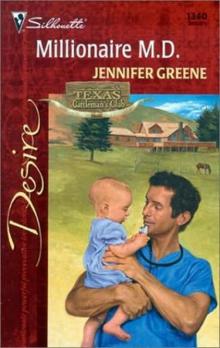- Home
- Jennifer Greene
The Baby Bump Page 2
The Baby Bump Read online
Page 2
“Honey, this is Ike—”
“Yes, I heard you say the name.” She wasn’t through glaring daggers at the son of a sea dog who’d try to cheat a vulnerable old man. “I really don’t care if your name is Judas or Sam or Godfrey or whatever else. But thanks so much for stopping by.”
He could have had the decency to look ashamed. Or afraid. Or something besides amused. There was no full-fledged grin, nothing that offensive, but the corners of his slim mouth couldn’t seem to help turning up at the edges. “You know, I have the oddest feeling that we’ve gotten off on the wrong foot.”
“You can bet your sweet bippy we have,” she said sweetly.
“I strongly suspect that you’ll change your mind before we see each other again. I promise I won’t hold it against you. In fact, I’m really happy you’re here. Your grandfather thinks the world rises and sets with you.”
“Uh-huh.” He could take that bunch of polite nonsense and start a fire with it. She wasn’t impressed. She made a little flutter motion with her hands—a traditional bye-bye—but she definitely planned to see him out the door. First, so she could lock the screen doors after him, and second, to make darned sure he took the dog.
He was halfway down the hall when he called out, “Pansy, going home now.” And the lazy, comatose, surely half-dead dog suddenly sprang to her feet and let out a joyful howl. Her tail should have been licensed as a weapon. It started wagging, knocking into a porch rocker, slapping against the door. Pansy seemed to think her owner was a god.
“Goodbye now,” Ginger said, just as she snapped the door closed on both of them and flipped the lock. Obviously, locking a screen door was symbolic at best. Anyone could break through a screen door. But she still wanted the good-looking son of a shyster to hear the sound.
She whirled around to see her grandfather walking toward her with a rickety, fragile gait.
“Sweetheart. I don’t understand what got into you. You know that was Ike.”
“I know, I know. You told me his name already.”
“Ike. Ike MacKinnon. My doctor. I mean that Ike.”
For the second time, she had an odd shivery sensation, that something in her grandfather’s eyes wasn’t...right. Still, she answered him swiftly. “You know what Grandma would say—that he can’t be a very good doctor if he can’t afford a pair of shoes and a haircut.”
When her grandfather didn’t laugh, only continued to look at her with a bewildered expression, she hesitated. She shouldn’t have made a small joke.
The situation wasn’t remotely funny—for him or her. Maybe she hadn’t immediately recognized that Ike was Gramps’s doctor—how could she? But she’d have been even ruder to him if she had known. Gramps had said precisely on the phone that the “doctor” was behind it all. Behind the conspiracy to take the land away from him and force him to move.
“Gramps, where is Cornelius?”
“I don’t know. Somewhere. Chores. The bank or something.” Her grandfather reached out a hand, steadied himself against the wall, still frowning at her. “Ike is a nice man, Rachel. And you’ve always liked him. I can’t imagine what put you in such a fuss. I can’t remember you ever being rude to a soul.”
She stopped, suddenly still as a statue.
Rachel was her grandmother’s name.
“Gramps,” she said softly. “It’s me. Ginger.”
“O’ course,” he said. “I know that, you silly one. Next time, don’t take so long at the hairdresser’s, okay?”
She smiled at him. Said “I sure won’t,” as if his comment and her reply made sense.
It didn’t, but since she was reeling from confusion, she decided to change gears. Gramps was easily coaxed to settle in a rocker on the veranda, and he nodded off almost before he’d had a chance to put his feet up. She was free then to stare at her car, which unquestionably was stuffed within an inch of its life.
The boxes and bags weren’t heavy. She refused to think about the pregnancy until she was ready to make serious life decisions—and Gramps’s problems came first. Still, some instinct had motivated her to pack in lighter boxes and bags. Of course, that meant she had to make a million trips up the stairs, and down the long hall to the bedroom where she’d slept as a girl.
The whole upstairs brought on another niggling worry. Nothing was wrong, exactly. She’d been here last Christmas, and the Christmas before, and for quick summer weekends. But her visits had all been rushed. She’d had no reason or time to take an objective look at anything.
Now...she couldn’t help but notice that the whole second floor smelled stale and musty. Each of the five bedrooms upstairs had a made-up bed, just as when her grandmother was alive. The three bathrooms had perfectly hung-up towels that matched their floor tile color. But her grandparents’ bedroom had the smell of a room that had been shut up and abandoned for months or more. Dust coated the varnished floor, and the curtains were heavy with it.
There was nothing interesting about dust, of course. As soon as you cleaned, the dust bunnies under the bed reproduced—sometimes doubled—by morning. Ginger had never met a housekeeping chore she couldn’t postpone. It was just...a little dust was a different species than downright dirt.
The whole place looked neglected.
Gramps looked neglected.
When the last bag had been hauled from the car, her childhood bedroom looked like a rummage sale, but enough was enough. She opened the windows, breathed in the fresh air then crashed on the peach bedspread. She was so tired she couldn’t think.
She was so anxious she was afraid of thinking.
In the past month, her entire life had fallen apart...which she had the bad, bad feeling she was entirely responsible for. She’d been bamboozled by a guy she’d lost her heart to, lost her job, shredded everything she owned to sublet her Chicago apartment, had a completely unexpected pregnancy that she had no way to afford or deal with...and then came the call for help from Gramps.
She’d fix it all.
She had to.
And Gramps came first because...well, because she loved him. There was no question about her priorities. It was just that she was getting the terrorizing feeling that her grandfather’s problems weren’t coming from without, but from within.
And if anyone was going to be able to give her a better picture of her grandfather’s situation, it was unfortunately—very, very, very unfortunately—his doctor.
Chapter Two
Still yawning, Ike lumbered downstairs barefoot with the dog at his heels. Pansy had woken him, wanted to be let out. He opened the back door, waited. Pansy stepped a foot outside, stopped dead, let out a howl and barreled back in the house.
Ike peered out. There happened to be a snake in the driveway. A big one. A rat snake, nothing interesting.
“You live in South Carolina,” he reminded Pansy. “You know about snakes. You just leave them alone. They don’t want to hurt you. Just don’t get in their way.”
Pansy had heard this horseradish before. It hadn’t worked then, either. She continued to dog his footsteps, closer than glue, all the way into the kitchen. He opened the fridge, peered in and had to shake his head.
He must have left the door unlocked again last night. The proof was in the white casserole on the top refrigerator shelf, tagged with a note from Maybelle Charles. The casserole was her mama’s famous Chicken Surprise recipe. On the counter there seemed to be a fancy pie—pecan—anchored on hot pads that he’d have to return. The pie would definitely be from the widow five doors down, Ms. Joelle Simmons. The basket on the front porch held a peck of late South Carolina peaches. Babs, he suspected.
This was possibly the best place for a single man to live in the entire known universe. The whole town seemed to think he was too thin and incapable of feeding himself. The unmarried female population all seemed convinced
that he needed a woman to shape him up. The more bedraggled he looked, the more they chased him. No one seemed to worry that he was a natural slob. They’d all decided, independently, that the right woman could fix minor male problems like that.
The food thing had started a day after he’d moved to Sweet Valley—which was more than three years ago. It was the same day he’d taken over old Doc Brady’s country practice, the same day he’d found this fabulous ramshackle place just a couple blocks from the center of town. Come to think of it—it was even the same day his parents had expressed stunned horror that he’d failed to take a cardiac surgery option at Johns Hopkins, the way they had, the way any self-respecting MacKinnon was supposed to do. His two siblings had already failed their parents by choosing their own paths, but Ike had been the worst disappointment, because he’d actually decided to follow the family heritage of doctoring. Only he was never supposed to take a job here, in this bitsy town that could barely afford a doctor in the first place.
Everything about Sweet Water was perfect for him...except for the minor issue with all the food. The single ladies expected their plates returned. They cooked and baked and made everything on pretty little girly-type plates that invariably had their names on the bottom. Only when he returned them, he usually had to fight to leave.
He was bushwhacked into a chair, fed something else, made to drink something else, was expected to shell out some flirtation and interest.
Ike couldn’t summon the energy to be rude, but he lucked out when Pansy showed up at his door. She refused to leave him, insisted on being adopted and went with him everywhere. She really helped with shortening the visits from all the single ladies.
Upstairs was home. Downstairs was his office—as in open to any and everyone.
Old Doc Brady hadn’t run it that way, but Ike did. He’d inherited some help with the place. Bartholomew had some personality issues, but he cleaned the whole first floor at night and loved the part-time work. A retired nurse named Stephie still lived in the area, and always came in if he needed extra help. And the mainstay of the office was sixty-year-old Ruby, who was a wee bit bossy—but she could run a small country without breaking a sweat.
Right now, though, was his favorite time of day. He fetched a mug of coffee and the paper and ambled out to the screened-in back deck. Tuesday he had no scheduled patients until ten. Ruby would shout to let him know when she got there.
Pansy refused to come out. She was still worried about the snake.
Ike was worried about nothing. The morning was cool; he’d had to pull on a sweatshirt. Occasionally he heard the regular sounds of school buses going by, cars starting to congregate behind lights, stores opening and the occasional conversation as people headed for work or breakfast.
He’d finished the paper and started his second mug of coffee when he heard Ruby’s voice from the front desk—and then the brisk snap of her footsteps coming down the hall to the back door. Par for the course, her portly shape was draped in a wild flower print, accessorized—her word, not his—by bright pink earrings, shoes and lipstick.
“Lady here to see you, Doc. Ginger Gautier. Cashner Gautier’s granddaughter. You’ve got a ten o’clock—”
He glanced at his watch. It was only 9:10. “If you wouldn’t mind, ask her to come on back.”
“You mean in your office? Or in an examining room?” More than once, Ruby felt obligated to explain appropriate behavior to him, always tactfully and framed as a question. Still, her tone made it clear that patients shouldn’t be seen on the back porch.
But Ginger wasn’t a patient. And he knew what she’d come to talk about.
It was always a touchy situation when someone embarrassed themselves. It wasn’t tough on the person who’d been the victim—him. But it was usually difficult for the person who’d done the embarrassing thing. Her.
As quickly as Ruby disappeared, he heard Ginger’s lighter footstep, charging fast—Ike suspected she’d
really, really like to get this meeting over with. From the open door, he could see her climb over the exhausted Pansy and step out onto the quiet back porch. She looked...
Delectable.
The hair was wild. Calling it red didn’t explain anything. The color wasn’t remotely ginger, like her name; it didn’t have any of that cinnamon or orange. It was more like dark auburn, with a mix of sun and chestnut, with some streaks of red shivering in the long, thick strands. She’d strapped it up with some kind of hair leash. In the meantime, she had silver shining in her ears, on her wrist. Today she was wearing greens. A dark green shirt, pale green pants.
There was a lot of blue in those eyes. The same blue as a lake in a storm, deep and rich.
Her face was an oval. The eyes took up a whole lot of space, dominated everything about her face. She had thin, arched brows, gloss on her lips, but otherwise he couldn’t tell if she wore any makeup. She had that redhead kind of skin, though...translucent, clear, clean...give or take the smattering of freckles.
As far as the body...well. She looked more like the kind of girl you brought home to meet Mom rather than the kind a man imagined under the sheets. But Ike was nonstop imagining that body under the sheets right now. There was a lot of music, a lot of passion, in the way she moved, the way she did everything he’d seen so far. Of course, he’d been celibate for too long a stretch, so maybe he was dreaming up the sizzle he sensed in her.
That celibacy had probably been dumb. Abstinence had never worked well for him, and he could have slept with any number of ladies in town. Somehow he never had.
Maybe that was because no woman had really enticed him before. Not like Ginger seemed to. Heaven knew he could analyze her body for three, four hours and still want to analyze more. For one thing, she had significantly perky breasts. The breasts themselves weren’t all that significant, but the perky was. They were round, firm, pressed just right against the shirt. She had no waist to speak of. But the pants—well, the pants begged to be taken off. They were just cotton, or some other lightweight fabric, but he could see the outline of her fanny, her thighs, her calves. She might be on the skimpy side, weight wise, but she looked strong and healthy, making it extremely easy to imagine her legs wrapped around him, without those pants. Without that blouse.
Damn, but she was refreshing. Challengingly refreshing. Even the resentment in her flash of a smile was disarming. He was getting mighty sick of women smiling at him as if he were slab of meat. Being disliked was a lot more interesting.
“I was hoping you’d come by to talk. Want some coffee?”
She nodded. “Black.” She motioned to Pansy. “Does that dog ever move?”
“Rarely. About ninety percent of the day she’s in a coma. But don’t say the word d-i-n-n-e-r or there’ll be hell to pay. And I’m talking relentless.” He motioned her to a white Adirondack rocker while he stepped into the kitchen/lab, came back with a mug for her, and a fresh one for him. “How’s Cashner doing today?”
“Happy as a clam.” She locked her palms around the mug. “But I’m not. Being with him has made me scared to death.”
He nodded. “I’m glad you came home.”
“I had no idea. I talked to him on the phone—”
“All the time. I know. He told me. He thinks the sun rises and sets with you. And he holds it together in some conversations, especially in the early part of the day. He’s always in good humor. Never a complainer. He can talk a blue streak, telling jokes, spinning yarns, talking about the tea farm. It’s not always apparent to other people what’s been going on.”
“He told me...” She hesitated, and he guessed the apology was coming. Or the closest he was going to get to an apology. “He told me his doctor was trying to take the land away from him. Force him to move. That his doctor was behind the conspiracy.”
“Yeah. That would be me. The evil doctor. Not about forcing him. That�
��s not my place. But especially in the last couple months, I’ve been pushing him to believe he could live a lot easier in a place with more help.”
“He doesn’t want help.”
“I know.”
“He doesn’t believe he needs help.”
“I know.”
“Last night I found him sitting in the wet grass. Wearing a suit. Around one in the morning.”
Ike winced in sympathy.
“He calls me Ginger. And a minute later, he’ll call me Rachel. My grandmother’s name. And sometimes I’m Loretta. Do you have a clue who Loretta is?”
Ike shook his head.
“And then there’s Cornelius. Cornelius was old before I was born. Half the afternoon yesterday, they played cards. Rummy. And canasta. Cornelius was as balmy-headed as my gramps. Nothing’s getting cleaned. Cornelius seems to make food sometimes. And forget other times...” At the sudden sound of voices coming from inside the house, she said immediately, “Do you have a patient? I know I should have called first, before stopping by.”
“First patient’s at ten. Ruby’ll let me know when he gets here.”
“Okay.” She took a breath. “Listen, Doc—”
“Ike,” he corrected her gently. “I’m your grandfather’s doctor, not yours.”
She immediately launched into an emotional sputter. “He was perfectly fine at Christmas and Easter both! He’s been fine every darned time I call! I was here in June for Pete’s sake. I don’t understand how he could have changed so much, so fast!”
“Because that’s how it hits people sometimes.”
She launched into the next rocket round of nonstop sputter. “Well, what exactly is wrong with him—and don’t tell me Alzheimer’s. Or that there’s nothing you can do. I want to know what tests you’ve run. If you’ve sent him to specialists. I may not have a heap of money, but my grandfather can afford the best of any kind of treatment. And I can stay here. I mean...I don’t know how on earth I could find a job here. But for however long it takes, I can stay here, live with him. I could make sure he gets everything he needs, nutrition and medicine and exercise or whatever else you think he needs—”

 The Unwilling Bride
The Unwilling Bride Wild in the Moment
Wild in the Moment No More Mr. Nice Guy
No More Mr. Nice Guy Secretive Stranger
Secretive Stranger Sunburst
Sunburst The Soon-To-Be-Disinherited Wife
The Soon-To-Be-Disinherited Wife Man From Tennessee
Man From Tennessee Mackinnon 03 - The Bonus Mom
Mackinnon 03 - The Bonus Mom Tender Loving Care
Tender Loving Care Can’t Say No
Can’t Say No The 200% Wife
The 200% Wife Wild in the Moonlight
Wild in the Moonlight Trouble in Paradise
Trouble in Paradise Millionaire M.D.
Millionaire M.D. A Daring Proposition
A Daring Proposition Silver and Spice
Silver and Spice Mesmerizing Stranger
Mesmerizing Stranger Bachelor Mom
Bachelor Mom Blame it on Cupid
Blame it on Cupid Pink Satin
Pink Satin THE HONOR BOUND GROOM
THE HONOR BOUND GROOM Sweets to the Sweet
Sweets to the Sweet The Baby Bump
The Baby Bump Ain’t Misbehaving
Ain’t Misbehaving Cupid’s Confederates
Cupid’s Confederates You Belong to Me
You Belong to Me Yours, Mine & Ours
Yours, Mine & Ours Little Matchmakers
Little Matchmakers Hot to the Touch
Hot to the Touch Conquer the Memories
Conquer the Memories Kisses From Heaven
Kisses From Heaven Pink Topaz
Pink Topaz Blame It On Paris
Blame It On Paris Irresistible Stranger
Irresistible Stranger The Billionaire’s Handler
The Billionaire’s Handler Wild in the Field
Wild in the Field Wintergreen
Wintergreen The Baby Chase
The Baby Chase